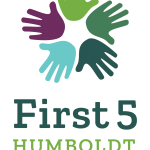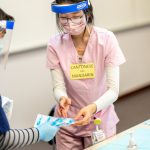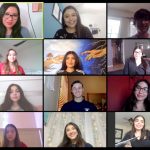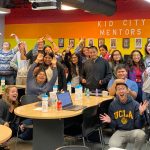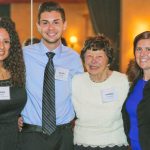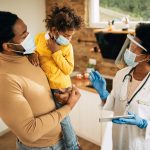Search Results for:
From ACEs to HOPE: First 5 Humboldt
Vesper Society links arms with leaders and communities to uplift through service, break down barriers, and elevate community voices. As we emerge from the pandemic, we shine a light on First 5 Humboldt as they begin to weave together a new social fabric. First 5 Humboldt is devoted to championing the rights and needs of their county’s families. Together with the community, First 5 Humboldt’s mission is to promote comprehensive, integrated systems of services for early childhood development in order to foster secure, healthy and loving children eager to learn and develop their full potential. They have done a remarkable job raising awareness in the community about the harmful impact of Adverse Childhood Experiences (ACEs) and toxic stress on children’s life-long health. The pandemic increased challenges for communities who have historically been marginalized by our systems. It furthered the stress of systemic racism, poverty, community violence, and historical trauma. These were layered on top of the traditional ACEs: physical/emotional abuse and neglect; sexual abuse; incarceration of a parent; parental substance use disorder; and parental divorce. Instead of being crushed by the situation, First 5 Humboldt adapted to meet the moment: they chose hope over despair to imagine the world they want to create. The most effective buffers to toxic stress are positive relationships. Tufts Medical Center articulated a model that melds the science of adversity with the science of resilience: HOPE (Health Outcomes from Positive Experiences). The four building blocks of the HOPE model are: Relationships with other children and adults through interactive activities Safe, equitable, stable, positive school and home environments Sense of connectedness through social and civic activities Opportunities for social emotional development, including playing with peers, self-reflection, and collaboration in art, physical activity, drama and music This model weaves together the threads of First 5 Humboldt’s... Read More
Asian Health Services Advocates for Language Access in COVID-19 Response
Vesper Society links arms with leaders and communities to uplift through service, break down barriers, and elevate community voices. As we emerge from the pandemic, we asked Asian Health Services to reflect on the impact of COVID-19 on the community. How did the pandemic uncover already-existing biases in our society? COVID-19 exposed our greatest vulnerabilities, exacerbating existing inequities within communities of color. Asian Americans were simultaneously blamed for spreading the virus and were ignored when it came to the needs of the community. Asian Health Services is a community health center in Alameda County, CA, that serves 50,000 patients who speak 14 different languages. We observed that many patients and community members were not coming out of their homes, even for grocery shopping. We suspected this was due to various barriers, including language access, fear due to the rising anti-Asian hate incidents, and lack of information. In June 2020, Asian Health Services launched a survey and found: Extremely low COVID-19 testing rates (3%) A lack of knowledge on where to get tested (49%) Reports of racial discrimination (6%) Job loss and/or reduced work hours (over 50%) Elevated mental health conditions (depression at 25% and stress at 75%) In response, Asian Health Services shared this survey with local governments. This led to the creation of the first three Asian American and Pacific Islander multi-lingual COVID-19 community testing sites in Oakland and Fremont, where 37,000 COVID-19 tests were conducted. How did Asian Health Services mobilize its resources to serve the community? We reorganized our staff to do the following: Launch a multi-lingual COVID-19 help line to set up COVID-19 testing appointments, provide social services (food and housing assistance), and mental health referrals. Establish a multi-lingual contact tracing team in partnership with Alameda County to assist in tracing over 2,000 cases and their... Read More
Resilient, Resourceful, and Ready in Imperial County
Vesper Society links arms with leaders in local communities that want to create a healthy future. Bordering on Mexico, Imperial County is one of the harshest economically disadvantaged regions in the country and the compounded impacts of COVID-19 have been many. Over a year into this pandemic, we asked Imperial Valley Regional Occupational Program (IVROP) to reflect on how COVID-19 has affected its students and what the coming year looks like. Families have suffered many losses, how has that impacted students? The COVID-19 outbreak was so severe in Imperial County last May 2020 that Governor Newsom brought in state resources to develop a unified command approach to decompress the hospital system. Positivity rates peaked at 33 percent and 650 patients had to be moved out of Imperial County. It has been traumatic for the community. Many families lost their loved ones and families have been destabilized. We have seen the achievement gap widen for younger students, vulnerable students, and students that lack family support. However, time and again the community has shown its resilience by supporting each other. What did IVROP do to support its students? One of the earliest tools that we developed was the Virtual Calming Room. It is a space where students find resources and strategies to help navigate difficult times. Students said they enjoy the Creativity and Coloring activities. One student created his own desktop picture for his laptop. Others have said they love the live animal cameras. Teachers and counselors have made the Virtual Calming Room accessible to their students because it provides social and emotional support. As schools begin to reopen, IVROP knows that thousands of students and families will need to be supported by a holistic range of services and partnerships with community agencies. Academics, college, and career readiness are important and... Read More
Radical Welcome at Kid City Hope Place
Vesper Society believes in a simple idea: a just society begins when everyone is well and respected as a human being. It has been a year since the pandemic turned the world upside down and exposed the cruel inequities in our society. We asked Anne Hawthorne, executive director of the Los Angeles United Methodist Urban Foundation to reflect on how COVID-19 has impacted the students, families, and community served by their Kid City program. In Los Angeles, the grief is palpable. Heavy. You’ve heard the statistics. South Central is the hardest hit. But do you know the people who have died? Do you know their names? The parents who would do anything for their children, who work two or three hard jobs, who bring bowls of freshly cut fruit to school staff, who go into the factory after hours to print T-shirts for the local youth agency? The grandmothers who raise the kids while parents work, who attend every back-to-school night, who hug them, who pat the masa and the beans into delicious pupusas? Kid City Hope Place, a youth leadership and college access program, was founded on the idea that an authentic welcome moves us from invitation to inclusion by engaging the whole person — “their thoughts, feelings, hopes, what they are going through and what brings them joy.” Founding pastor Rev. Sandie Richards also believes radical welcome, a central social value of the United Methodist Church, “engages with the community that surrounds the person: their schools, family, friends.” But what does radical welcome look like in the middle of a pandemic, and at its epicenter? A few weeks ago, Anne Hawthorne, Kid City Director, made a condolence call to the home of one of the Kid City families. From the porch, the mother called out “cada familia,... Read More
Remembering Barbara Varenhorst (1928-2021)
Getting people to work together, creating a social culture that supports positive relationships, educating the heart to reduce the alienation behind many problems – Barbara Varenhorst dedicated her life to these activities. Daughter of a Lutheran pastor, Barbara graduated from St. Olaf College in Minnesota, received her master’s degree in student personnel work at Syracuse University, and earned her Ph.D. in counseling psychology from Stanford University in 1964. Barbara joined the Palo Alto Unified School District as a consulting psychologist in the 1960’s. In 1970 when she received a grant from the state to develop an exemplary guidance program, she asked the students what they needed. The students told her rather than go to the counselors, they would go to their friends for help with personal problems. “I didn’t want to hear that,” said Barbara. “I wanted to hear that they needed us.” Then she thought, “why not teach them to help their friends?” This was the turning point that changed Barbara’s life. In 1986 Barbara and a team of colleagues founded the National Peer Helping Association, now known as the National Association of Peer Program Professionals. “Adolescence” according to Barbara, “can be a time of intense loneliness when youth are reluctant to disclose problems to parents. It is critical they have another option, someone with whom to speak. The peer counseling programs, integrated into the school environment, provide a means of getting important and timely assistance.” Author of Real Friends: Becoming the Friend You’d Like to Have and Peer Ministry: Basic Curriculum, Barbara designed programs to teach youth how to listen, how to care, and how to make better decisions. It is this passion for young people that Barbara infused into the Vesper Society. Barbara crossed paths with several Vesper Society leaders through the Evangelical Lutheran Church in... Read More
Welcome Marin City Health and Wellness Center!
Vesper Society believes that a just society begins when everyone is well and respected as a human being. We have linked arms with Marin City Health and Wellness Center to imagine a more equitable future for their communities. Marin City Health and Wellness Center is a Federally Qualified Health Center headquartered in Sausalito, CA. Founded in 2006 by a grassroots effort, the organization’s mission is to provide innovative health and wellness services to all, making primary care accessible for low-income families of a historically African American community. The Marin City Health and Wellness Center’s goal of African American Health Equity speaks to Marin City’s historical significance within the African American community dating back to 1942 when the Bechtel Company built a housing center for its employees during World War II to help meet the demand for new ships. When the war ended, many of the African American shipyard laborers who had migrated from the Southern United States became permanent residents of Marin City either by choice or due to various racial discriminatory laws limiting housing opportunities in other parts of Marin County (Source: Marin City Development Corporation). The organization now operates 3 different locations throughout the Bay Area including its flagship location in Marin County, the Bayview Clinic in San Francisco, and a women’s health clinic in San Rafael. Marin City Health and Wellness Center is also on pace to open a new location at 100 Philips Drive in Sausalito in 2021 which will provide patients with high-quality primary medical care services, dental care, behavioral health care and recovery services in a beautiful, modern, and technologically advanced setting. The Bayview Clinic in San Francisco has a rich history of providing health care services in one of San Francisco’s historically black neighborhoods. For decades, the clinic was led by Dr.... Read More

